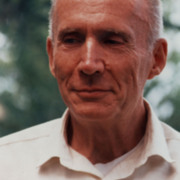Robert A. Johnson (1) (1921–2018)
Author of Inner Work: Using Dreams and Active Imagination for Personal Growth
About the Author
Robert A. Johnson is a noted lecturer and Jungian analyst in private practice in San Diego, California
Works by Robert A. Johnson
The Fisher King and the Handless Maiden: Understanding the Wounded Feeling Function in Masculine and Feminine… (1993) 259 copies, 2 reviews
Living Your Unlived Life: Coping with Unrealized Dreams and Fulfilling Your Purpose in the...Second Half of Life (2007) 127 copies
Lying with the Heavenly Woman: Understanding and Integrating the Feminine Archetypes in Men's Lives (1994) 115 copies
Associated Works
Tagged
Common Knowledge
- Canonical name
- Johnson, Robert A.
- Legal name
- Johnson, Robert Alex
- Birthdate
- 1921-05-26
- Date of death
- 2018-09-12
- Gender
- male
- Nationality
- USA
- Birthplace
- Portland, Oregon, USA
- Place of death
- San Diego, California, USA
- Places of residence
- San Diego, California, USA
- Education
- University of Oregon
Stanford University
C. G. Jung Institute, Zurich - Occupations
- Episcopal monk
Jungian analyst - Relationships
- Luke, Helen (colleague)
- Organizations
- St. Gregory's Abbey, Three Rivers (Michigan)
- Short biography
- Robert A. Johnson is among the most influential interpreters of Jungian psychology of our time. One of the few living Jungians who studied with Jung himself, Johnson's term "inner work" has entered the spiritual vocabulary of our era. In 2002 he received an honorary doctorate in humanities and a lifetime achievement award from Pacifica Graduate Institute. He lives in San Diego. [from Living Your Unlived Life (2007) and Wikipedia.org]
Members
Reviews
Lists
Awards
You May Also Like
Associated Authors
Statistics
- Works
- 26
- Also by
- 2
- Members
- 4,740
- Popularity
- #5,310
- Rating
- 3.9
- Reviews
- 27
- ISBNs
- 152
- Languages
- 12
- Favorited
- 3














